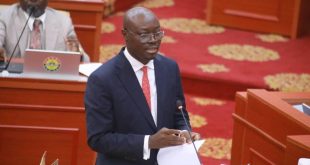In a defamation lawsuit filed against Member of Parliament Kennedy Ohene Agyapong, Anas Aremeyaw Anas challenged the High Court judge Justice Eric Baah’s perceived bias. However, the Supreme Court denied Anas’ plea.
Anas had applied for the High Court’s ruling to strike out Agyapong’s defamation lawsuit to be overturned. The lawsuit resulted from public remarks and a broadcast in which Agyapong claimed that Anas was utilizing extortion and nefarious tactics while disguising his reporting as investigative journalism.
Chief Justice Gertrude Sackey Torkornoo, Justices Henrietta Mensa-Bonsu and Samuel Asiedu, and Justice Asiedu voted in favor of a 3-2 majority that denied Anas’ application.
The court dismissed Anas’s claim that Justice Baah was prejudiced against him and lacked jurisdiction to hear the lawsuit.
Later, the complete rationale for the ruling was made available to the public by being submitted in the court register.
In a March 15th, 2017 ruling, Justice Baah of the High Court determined that although Agyapong’s remarks could have been slanderous, they were true and therefore not slanderous under the defense of justification.
The judge further implied that Anas had the ability to utilize his investigations to topple a president by referring to Anas’s work as “investigative terrorism” as opposed to journalism.
Despite being forceful, the Supreme Court ruled that Justice Baah’s remarks did not demonstrate prejudice. As is a judge’s responsibility in such cases, Justice Asiedu, who wrote the court’s ruling, said that the judge’s comments were supported by an examination of the material that was presented to him.
The court stressed that Justice Baah’s remarks were the outcome of his evaluation of the evidence rather than being expressed in a prejudiced way.
Chief Justice Torkornoo expressed agreement with the majority decision, pointing out that Justice Baah’s conclusions were derived from the material that was submitted. She stressed that since the Supreme Court was unable to reexamine the evidence in a judicial review case, any challenge to these conclusions was to be made through the appeal court.
Justices Issifu Omoro Tanko Amadu and Emmanuel Yonny Kulendi disapproved of the majority’s position in dissenting opinions. Given that Anas was found guilty of a crime in the civil case, Justice Kulendi contended that Justice Baah’s remarks were obviously biased against him.
Justice Amadu expressed worries that the majority’s ruling might erode the Supreme Court’s constitutionally mandated supervisory authority.
Source: Ghanatodayonline.com
 Ghanatodayonline.com News, Politics, Health, Education & More
Ghanatodayonline.com News, Politics, Health, Education & More




